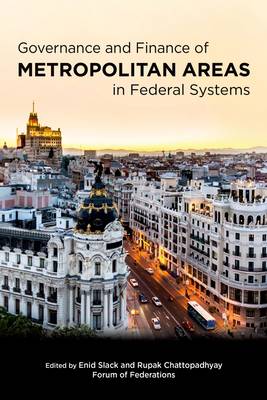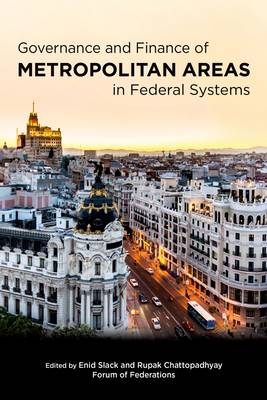
Door een staking bij bpost kan je online bestelling op dit moment iets langer onderweg zijn dan voorzien. Dringend iets nodig? Onze winkels ontvangen jou met open armen!
- Afhalen na 1 uur in een winkel met voorraad
- Gratis thuislevering in België vanaf € 30
- Ruim aanbod met 7 miljoen producten
Door een staking bij bpost kan je online bestelling op dit moment iets langer onderweg zijn dan voorzien. Dringend iets nodig? Onze winkels ontvangen jou met open armen!
- Afhalen na 1 uur in een winkel met voorraad
- Gratis thuislevering in België vanaf € 30
- Ruim aanbod met 7 miljoen producten
Zoeken
Governance and Finance of Metropolitan Areas in Federal Systems
Enid Slack, Rupak Chattopadhyay
Hardcover | Engels
€ 62,95
+ 125 punten
Omschrijving
This volume examines the governing structure and finances of metropolitan areas in federal systems. Taking a comparative approach, each chapter examines two large metropolitan areas in a federal country, including Australia (South East Queensland and Perth); Brazil (Belo Horizonte and Sao Paulo); Canada (Toronto and Vancouver); Germany (Hamburg and Central Germany); India (Hyderabad and Mumbai); South Africa (Cape Town and Gauteng metropolitan region); Spain (Barcelona and Madrid); Switzerland (Geneva and Zurich); and the United States (Louisville and Los Angeles). Through individual case studies, the contributors present the national context for metropolitan areas (for example, whether local governments are in the national constitution) and the characteristics of two metropolitan areas in the country. The contributors emphasize how the delivery of services is coordinated across municipal boundaries, the extent to which land use planning is coordinated on a metropolitan-wide basis, how costs are shared throughout the region, the level of citizen access to local government decisions, and the degree of local government accountability. As well, they discuss the role of the federal and provincial/state governments in these large metropolitan areas and, in particular, the circumstances under which the federal government gets involved in metropolitan issues. Illustrated with nearly 100 figures, tables, and maps, this comprehensive overview presents a valuable collection of contributions from the field's top scholars.
Specificaties
Betrokkenen
- Auteur(s):
- Uitgeverij:
Inhoud
- Aantal bladzijden:
- 384
- Taal:
- Engels
Eigenschappen
- Productcode (EAN):
- 9780199008971
- Verschijningsdatum:
- 26/02/2014
- Uitvoering:
- Hardcover
- Formaat:
- Genaaid
- Afmetingen:
- 155 mm x 229 mm
- Gewicht:
- 612 g

Alleen bij Standaard Boekhandel
+ 125 punten op je klantenkaart van Standaard Boekhandel
Beoordelingen
We publiceren alleen reviews die voldoen aan de voorwaarden voor reviews. Bekijk onze voorwaarden voor reviews.











